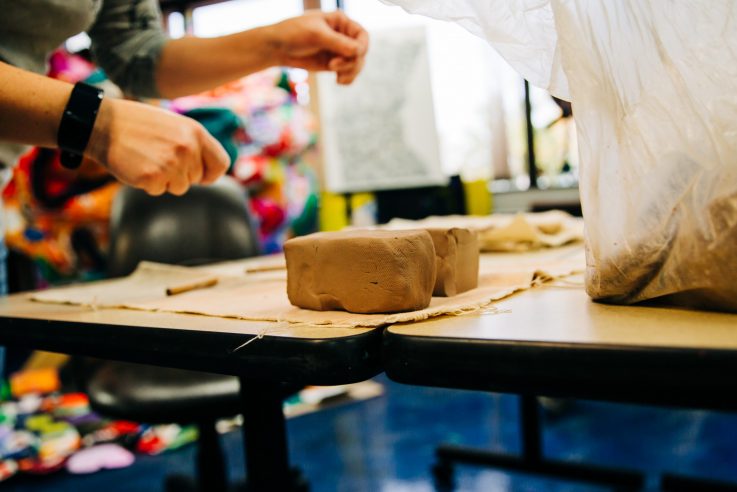Create, Collaborate, and Contribute
The Post-Master’s Certificate in Art Therapy combines the expressive use of art media and psychotherapeutic concepts to encourage the development of your professional identity and build skills to provide service to diverse communities and support social justice and societal change.
An Experientially Focused and Integrated Curriculum
The 37-credit post-master’s certificate program provides you the required art therapy content courses and experiential learning that is infused with hands-on creative opportunities in all of the art therapy courses.
The 100 hour practicum and 600 hour internship field experience provides you with supportive and integrative clinical or community based learning opportunities. Of the total hours, 350 of the hours must be in providing direct art therapy services. On-site supervision of one hour for every 10 hours of client contact is required.
The program will culminate with a demonstration of your knowledge, skills, and experiences via a professional portfolio.
Find Your Mentor
Under the mentorship of faculty, who are credentialed art therapists and clinical mental health practitioners, you will be able to explore and enhance your professional and artistic identity. Fostering an inclusive and supportive connection with the faculty, and fellow students, is the foundation of the Adler Graduate School learning experience.
Opportunities for Specialization
To enhance your learning, the Art Therapy Program offers a variety of special topic art therapy courses for you to choose from. These courses allow you to engage in a deeper study of topics that may be of interest to you. Course options include the application of art therapy in working with: Addictions, Autism Spectrum Disorders, older adults, individuals and families impacted by cancer, military veterans and their families, grief and loss, spirituality, and sexuality.
The art therapy field experience also provides you an opportunity to select clinical or community based sites based on your interest areas.
Credentialing Information
Adler Graduate School’s Art Therapy Post-Master’s Certificate will prepare you with the academic and field experiences to pursue Registration and Board Certification from the Art Therapy Credentials Board (ATCB) after completion of post-certificate experience and supervision.
Spotlight
Learn more about our Art Therapy faculty, students, and alumni.
Your Future
At Adler Graduate School, your experience in the art therapy program will immerse you in a creative and professional growth process that may lead you to personal transformation and deeper connections to your community.
Opportunities to create your career path
The profession of art therapy encourages the creative engagement and application of art therapy processes across a wide spectrum of clinical, educational, cultural, and community contexts. The work may involve providing services to individuals, families, or groups/organizations. Your professional identity as an art therapist and artist provides a fertile ground for you to network, collaborate, advocate, and craft a career path that fits you.
Career Options
- Addiction recovery services
- Behavioral/mental health programs
- Corrections
- Disability services
- Domestic abuse shelters/support agencies
- Eating disorder clinics
- Educational settings (primary, secondary and higher education)
- Family therapy
- Group homes/Residential treatment centers
- Hospitals (Medical/rehabilitation/psychiatric)
- Hospice
- Immigrant services
- LGBTQAI+ communities
- Nursing homes
- Private practices
- Social justice organizations
- Veteran service agencies
Program Minimum Expectations
To prepare competent entry-level art therapists in the cognitive (knowledge), psychomotor (skills), and affective (behavior) learning domains.rn
All Post-Masters Certificate art therapy students will have the ability to:
- Demonstrate knowledge of:
- Adlerian and comparative theories
- History and theories of art therapy
- The Expressive Therapies Continuum
- Ethical codes of professional practice
- The connections between neuroscience and art therapy
- Demonstrate skills of:
- Documenting and presenting case conceptualizations
- Proficient practice of art therapy with diverse populations and acquire multicultural competency that reflects attunement to current global social justice and advocacy issues.
- Demonstrate attitudes/behaviors around:
- Developing a professional identity as both an art therapist and an artist through personal creativity
- The importance of self-care and self-advocacy
- The Art Therapy Program is committed to support institutional stability in:
- Monitoring long-term enrollment management, tracking, and analysis.
- Responsible resource management and development.
- Securing and maintaining the highest level of accreditation available for the Art Therapy Program.

